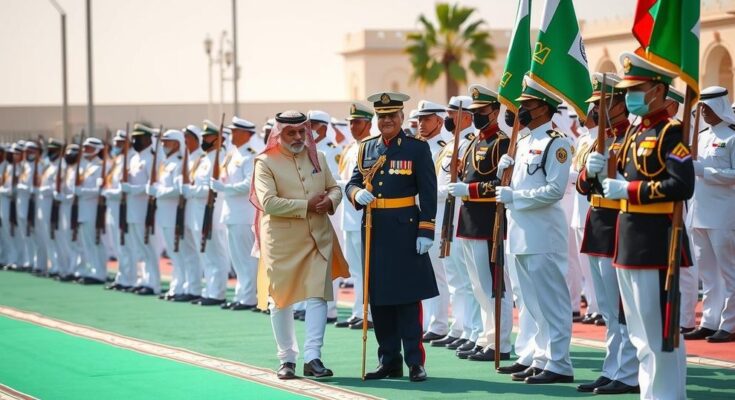Prime Minister Narendra Modi’s visit to Kuwait on the invitation of Emir Sheikh Meshal Al-Ahmad Al-Jaber Al-Sabah included a ceremonial welcome and discussions on enhancing bilateral relations. Modi emphasized the importance of trade, investment, and cultural ties and acknowledged the contributions of the Indian diaspora in Kuwait. This visit marks a historic milestone, being the first by an Indian prime minister in 43 years, aiming to foster a strategic partnership between the two nations.
During his two-day state visit to Kuwait, Prime Minister Narendra Modi received a ceremonial welcome, including a guard of honour at the Bayan Palace. This visit marks the first by an Indian prime minister to Kuwait in 43 years, following an invitation from Emir Sheikh Meshal Al-Ahmad Al-Jaber Al-Sabah. Upon arrival, PM Modi was warmly greeted, setting the tone for extensive discussions with key Kuwaiti leaders about enhancing bilateral relations.
On the first day of his visit, Prime Minister Modi engaged with the Indian diaspora in Kuwait at the “Hala Modi” event, emphasizing the significant contributions of Indian workers to Kuwait’s development. He also visited the Gulf Spic Labour Camp, underscoring their aspirations and linking them to his vision of “Viksit Bharat 2027,” praising their dedication and diligence.
In an interview with Kuwait News Agency (KUNA), PM Modi highlighted the importance of trade and commerce in strengthening ties between India and Kuwait, commenting on the growing trend of bilateral trade. He expressed his pleasure at the presence of Indian products in Kuwait and acknowledged the longstanding economic relationships dating back to ancient trade between the two nations.
The Prime Minister emphasized the strong historic bonds shared by the two countries, indicating that their partnership covers various dimensions, including defense, investment, and energy. He remarked, “Overall, the bilateral ties are progressing well and if I could say, scaling new heights. I eagerly look forward to my talks with His Highness the Amir to elevate our ties in various areas,” indicating optimism for future collaboration.
Additionally, Modi pointed to the significant presence of the Indian community in Kuwait, over one million strong, which plays a vital role in enhancing bilateral ties. He acknowledged the interest of the Kuwait Investment Authority in investing in India, reinforcing the mutual benefits of collaboration in diverse sectors, including infrastructure and digital economy. Furthermore, he spoke of cultural connections that flourish between the two nations, with Indian cuisine and cinema resonating in Kuwaiti society.
As the visit concluded, the Prime Minister called Kuwait’s Vision 2035 a transformative initiative, aligning with India’s economic aspirations. Emphasizing the community’s impact on society, he expressed confidence that Kuwaiti officials will continue to support and recognize the rich contributions of the Indian diaspora, strengthening the longstanding ties between the two countries.
The visit of Prime Minister Narendra Modi to Kuwait marks a historic moment for India-Kuwait relations, being the first by an Indian prime minister in over four decades. India’s historical connection with Kuwait has been rooted in trade and cultural exchanges for centuries. The Indian diaspora constitutes a significant part of Kuwait’s population, providing valuable contributions to the local economy and cultural landscape. This visit aimed to enhance bilateral relations and explore opportunities in various sectors such as trade, defense, and energy, while reinforcing cultural ties.
Prime Minister Narendra Modi’s visit to Kuwait established a firm foundation for revitalizing and enhancing the relationship between India and Kuwait. The visit not only highlighted the longstanding historical and economic ties between the two nations but also set the stage for future collaborations in various fields. The engagement with the Indian diaspora and discussions on trade, investment, and cultural exchanges signify a commitment to strengthening this crucial partnership in the years to come.
Original Source: www.hindustantimes.com




